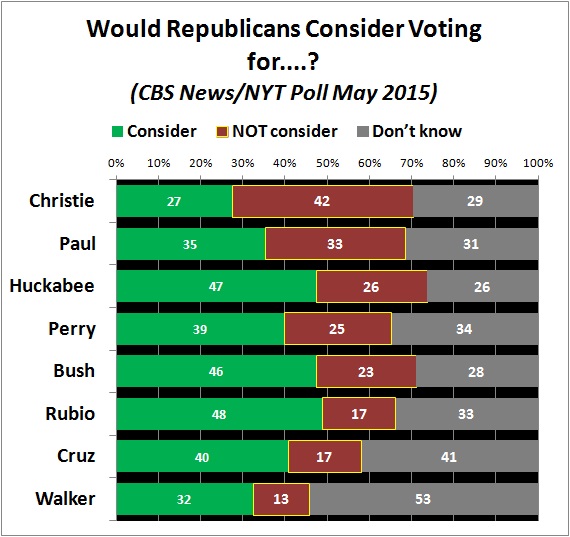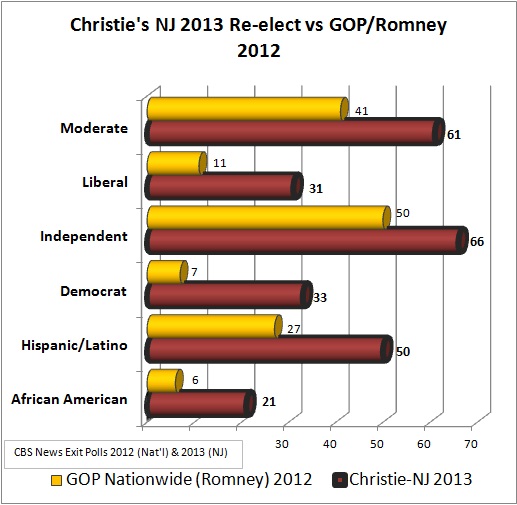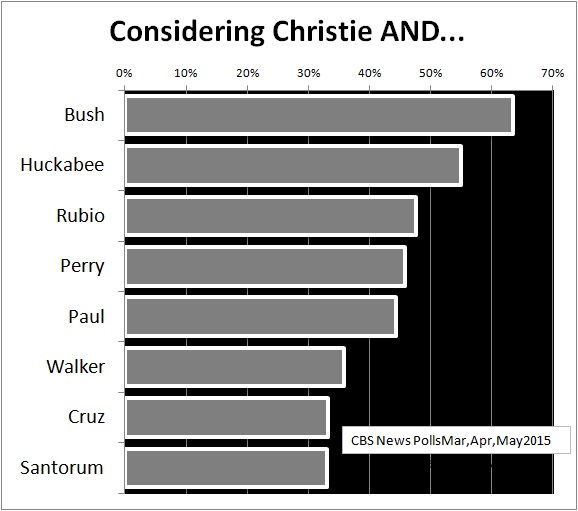Can retail politics turn Chris Christie's poll numbers around?
Chris Christie enters the presidential race with a slightly different challenge than his Republican opponents: while many of those candidates are still introducing themselves to voters, he needs to make them reconsider him. Lately Christie has consistently had the largest number of Republicans nationwide saying they wouldn't consider voting for him. In May, that number was 42 percent.
On the other hand, a crowded field could mitigate that somewhat: he doesn't need to win over a majority because getting 15 to 20 percent in this multi-candidate field could mean staying competitive, at least in the early stage of the race.
His announcement speech returned to compromise and working together - it recalled a bit of the sentiment that once saw him put up strong bi-partisan numbers in New Jersey. On the night of his re-election in 2013 he drew support from one-third of Democrats, one-third of liberals, as well as strong backing from minority voters - remarkable for a Republican almost anywhere these days - and a very different coalition from the one that the GOP assembled nationwide in 2012.
At the time, those results conferred upon him a mantle of electability when talk invariably turned to a 2012 presidential run. But that crossover support has since receded. In 2014, Christie saw his numbers statewide and nationally take a hit post-Bridgegate, and measures returned to more typical partisan splits, at best. More recently his poll numbers in New Jersey have dropped as his unfavorable ratings nationwide have also risen.
It is little wonder he's headed for New Hampshire now, where his campaign looks to a tradition of town-hall gatherings and "retail" politics, which could lend itself to Christie's direct style. And while Christie and his 13 opponents will surely run in the primaries with the conservative label, New Hampshire offers Christie a chance to draw support from a larger set of conservative-leaning independents or moderate Republicans, who might be more drawn to a message of working across party lines. Most voters say they favor compromise when they're frustrated with Washington, but the most ideological partisans - who also the ones dogged enough to show up for the smaller caucuses - tend to be a little more steadfast.
New Hampshire is also important to him because from there, things could get tougher. The tentative primary calendar has a decidedly southern and more conservative tilt through Super Tuesday, which means Christie - and any of the other Republicans, for that matter - will need to generate some momentum by doing well and compelling voters in subsequent states to take another look at them.
Across our polling this spring, looking at Republicans considering Christie in the last three months, there aren't dramatic differences between Republicans and independents nationwide. Conservative-leaning independents do express a little more uncertainty, or perhaps openness, to Christie's candidacy than do those Americans who identify themselves as Republican, though not a lot more willingness to consider him at this point.
Based on an analysis of CBS News polls taken this spring, the Republican voters who are considering Christie are also considering Jeb Bush more than any other single candidate. This, however may be a sign of the power of name recognition still running through all these measures, since many of the best-performing candidates are also the better known.



